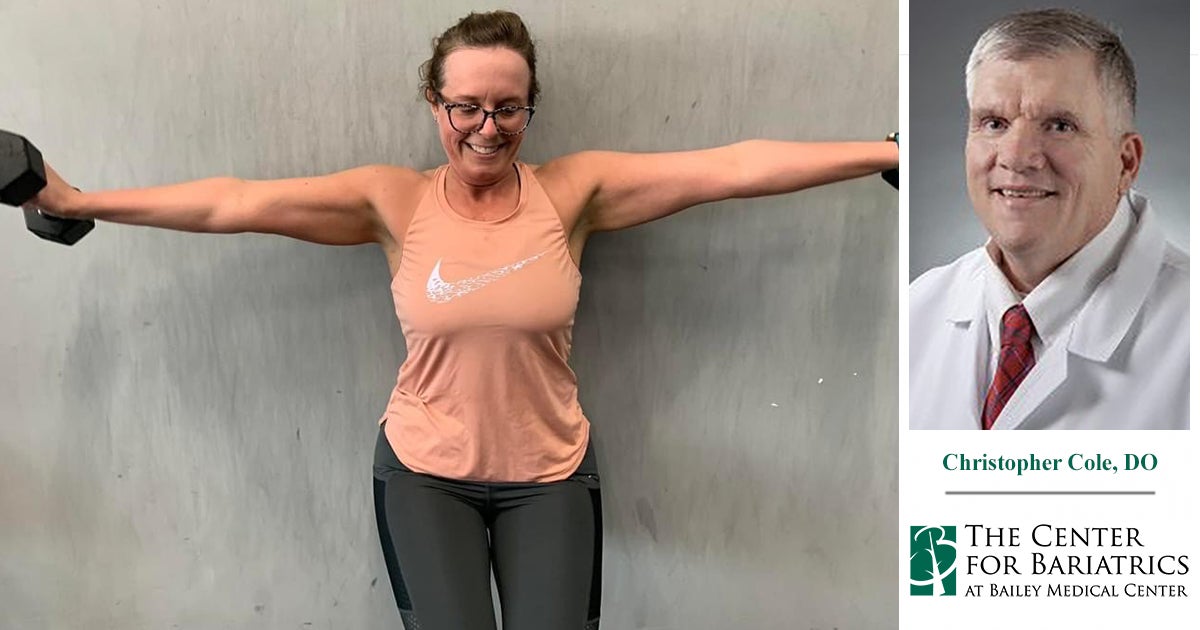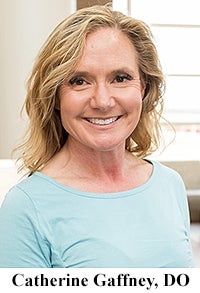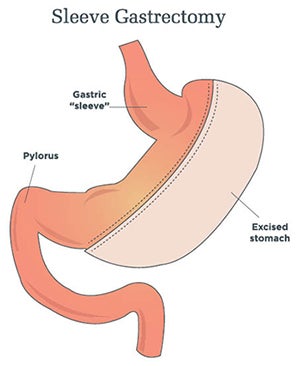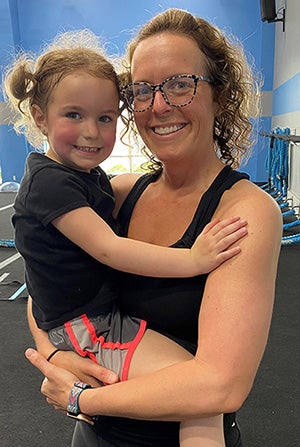
Before her surgery, Courtney Edwards, 37, didn’t have much time, energy or confidence to work out at a gym. That all changed following her sleeve gastrectomy surgery at The Center for Bariatrics at Bailey Medical Center.
 “My daughter Cheylee, who is now 4 years old, was still pretty young when I had my surgery,” said Edwards. “It was during the COVID-19 pandemic when a lot of people, including me, were working from home. The only time I exercised was when we went outside and I’d push her in the stroller. At that time, I weighed 246 pounds, so walking was the limit of what I could do.”
“My daughter Cheylee, who is now 4 years old, was still pretty young when I had my surgery,” said Edwards. “It was during the COVID-19 pandemic when a lot of people, including me, were working from home. The only time I exercised was when we went outside and I’d push her in the stroller. At that time, I weighed 246 pounds, so walking was the limit of what I could do.”
The middle child with two brothers, Edwards recalls being heavier than many of her high school classmates. After graduating from Oklahoma State University with a major in business administration and a minor in marketing, she worked for the Cherokee Nation for more than 16 years.
“I come from a Cherokee family, as three of my four grandparents were Cherokee,” said Edwards.
Researching bariatric surgery
Today, Edwards serves as the administrative assistant for the general manager of the Hard Rock Hotel & Casino in Catoosa. It was during work that she met a co-worker who was concerned about her own weight.
 “It seemed like I had been losing the same 50 pounds over and over again,” said Edwards. “A friend at work started talking about weight loss surgery and we researched it together. It was so great to share the entire process with someone. We ended up having our surgeries two weeks apart, though we had different surgeries. She had gastric bypass surgery while I had the sleeve gastrectomy.”
“It seemed like I had been losing the same 50 pounds over and over again,” said Edwards. “A friend at work started talking about weight loss surgery and we researched it together. It was so great to share the entire process with someone. We ended up having our surgeries two weeks apart, though we had different surgeries. She had gastric bypass surgery while I had the sleeve gastrectomy.”
Before she could have the surgery, Edwards met with Catherine Gaffney, D.O., who guided her through the many preparations.
“There were a number of tests, sometimes every month, I had to do to show that I was physically and mentally healthy enough to go on with the surgery. I had an EKG and a stress test to see if my heart was healthy enough to have the surgery.”
Edwards also had to quit smoking, which was a big habit for her to break. “I was told that they would test my blood system for nicotine before the surgery could take place, so I knew I had to quit.”
Prospective surgery patients are also asked to attend a seminar in person or online.
“I appreciated how organized and thorough the preparations for surgery were,” she said. “It helped me feel good that this was the best step for me.”
 With her preparations completed, Edwards then underwent a sleeve gastrectomy with surgeon Christopher Cole, D.O.
With her preparations completed, Edwards then underwent a sleeve gastrectomy with surgeon Christopher Cole, D.O.
Sleeve gastrectomy
The laparoscopic sleeve gastrectomy, often called the "sleeve," is performed by removing approximately 80% of the stomach. The remaining stomach is the size and shape of a banana. This new, smaller stomach holds less food, thus reducing the amount of food (and calories) that is consumed.
By removing the portion of the stomach that produces most of the "hunger hormone," the surgery also influences the metabolism. It decreases hunger, increases feeling full and allows the body to reach and maintain a healthy weight as well as control blood sugar.
Read more about a sleeve gastrectomy and watch a video that details what happens during the surgery.
New active life
Now that she has fully recovered from bariatric surgery, Edwards is very happy with the results, especially after increasing her exercise activities.
“I go to the gym a couple days a week for a ‘Burn Boot Camp’ workout,” she said. “Each group session is led by a trainer and you do short intervals of exercises for about 45 minutes. Everyone there is very accepting, working to get into better physical shape. It really helped my confidence.”
The workouts have also helped Courtney lose nearly 100 pounds.
“I’ve got two pounds to go to reach my target weight, but I try not to get hung up on the number,” Edwards said. “My initial goal was to weigh 160 pounds and I thought I would never get there. But I started slowly, losing a pound or two a month. When I got to 160, I wished I had started at the gym earlier. Still, I’m at a healthy BMI now and working out to stay healthy and tone up.”
Edwards gives lots of credit to the team at The Center for Bariatrics at Bailey Medical Center.
“I loved Dr. Gaffney. She was very quick to explain everything if I didn't understand. Their whole team was wonderful. Mo showed me how to do exercises correctly. The dietitians talked to me about preparing food after I had the surgery. My post-op navigator, Stacie Burns, knows everything about bariatric surgery because she went through it herself.
 “My surgeon, Dr. Cole, was just amazing. Nine months or so after my bariatric surgery, I went back to Dr. Cole to remove my gallbladder, which is common for some bariatric patients. I went back to Dr. Cole because I was so impressed with him, especially how he put my mind at ease.”
“My surgeon, Dr. Cole, was just amazing. Nine months or so after my bariatric surgery, I went back to Dr. Cole to remove my gallbladder, which is common for some bariatric patients. I went back to Dr. Cole because I was so impressed with him, especially how he put my mind at ease.”
Best of all, Edwards is looking forward to helping her daughter live a long, healthy life.
“I want to be a role model for her to take care of her own health, showing her how your health can improve by not smoking, eating healthy foods and getting lots of exercise,” Edwards said. “She goes to the gym with me now when they have a little kids’ class. Sometimes they even do a ‘Mommy and Me’ class, which is really fun.
“By seeing me in the gym, I think she will grow up with a healthy appreciation for exercising. At the very least, she will learn to be confident and to work hard to be in good physical shape. That will help her be confident in other areas as well.”
For more information about weight loss surgery at The Bariatrics Center at Bailey Medical Center, click here.
